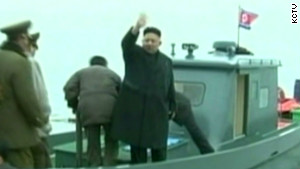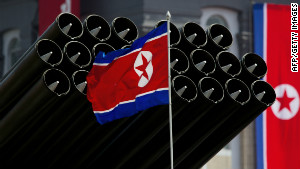(CNN) -- Saber rattling rose to new levels Monday on the Korean Peninsula as Pyongyang officials "scrapped" the armistice credited for nearly 60 years of uneasy peace and then failed to answer a hotline phone.
"The Korean Armistice Agreement is to be scrapped completely just from today," said a spokesman for the North Korean military -- the Korean People's Army Supreme Command -- according to Rodong Sinmun, the official newspaper of North Korea's ruling Workers' Party.
North Korea cited the U.N. Security Council's unanimous passage Thursday of tougher sanctions against Pyongyang for carrying out missile and nuclear tests.
North Korea declares 1953 armistice invalid
"The collective sanction is precisely a declaration of war and an act of war against the DPRK," said the newspaper, using the initials of North Korea's formal name, the Democratic People's Republic of Korea.
U.S.-South Korean drills
North Korea's announcement came as military drills involving South Korea and the United States were taking place. The exercises, called Key Resolve, are in conjunction with the Foal Eagle joint exercises that began March 1 and are scheduled to last two months. More than 3,000 U.S. forces are taking part in Key Resolve, according to U.S. Forces Korea.
North Korea also has called the annual training exercises "an open declaration of a war."
 North Korea has new weapons program
North Korea has new weapons program  What to make of N. Korea's newest threat
What to make of N. Korea's newest threat  Korean War remembered
Korean War remembered "Under the cloak of the UNSC, the U.S. seeks to realize its aggressive purpose against the DPRK by threatening its right to existence as well as its sovereignty," the newspaper continued. "What is graver is the fact that the U.S. cooked up the resolution on sanction timing to coincide with the 'Key Resolve' and 'Foal Eagle' joint military exercises."
The U.N. Command notified the North Korean military on February 21 of the exercise dates, noting they are annual joint exercises defensive in nature and not related to current events on the Korean Peninsula.
In remarks delivered Monday at the Asia Society in New York, national security adviser Tom Donilon said, "The United States will not accept North Korea as a nuclear state; nor will we stand by while it seeks to develop a nuclear-armed missile that can target the United States."
He added, "The international community has made clear that there will be consequences for North Korea's flagrant violation of its international obligations."
Why the Korean War still matters
He announced that Park Geun-hye, who last month became South Korea's first female president, has accepted President Barack Obama's invitation to visit Washington in May.
Donilon attended Park's inauguration in Seoul. "When we met, I conveyed to President Park President Obama's unwavering commitment to the defense of the Republic of Korea," he said.
He cited "provocations and extreme rhetoric" from the impoverished North. "To get the assistance it desperately needs and the respect it claims it wants, North Korea will have to change course," he said. "Otherwise, the United States will continue to work with allies and partners to tighten national and international sanctions to impede North Korea's nuclear and missile programs."
Donilon cited the Treasury Department's imposition of U.S. sanctions against the Foreign Trade Bank of North Korea, the country's main foreign exchange bank, "for its role in supporting" Pyongyang's weapons of mass destruction program.
"North Korea's claims may be hyperbolic, but as to the policy of the United States, there should be no doubt: We will draw upon the full range of our capabilities to protect against, and respond to, the threat posed to us and our allies by North Korea," he said.
Concern over 'belicose rhetoric'
In Washington, White House Press Secretary Jay Carney told reporters that Pyongyang's "bellicose rhetoric" had raised concerns. "The DPRK will achieve nothing by threats or provocations, which will only further isolate North Korea and undermine international efforts to ensure peace and stability in northeast Asia," he said.
Also Monday, North Korea did not answer its hotline with Seoul, South Korea's Unification Ministry said, according to the Yonhap news agency.
The ministry said the North did not answer two attempts to communicate by telephone at 9 a.m. and 4 p.m. local time.
The military hotline was set up in 2004 with the goal of easing tensions along the heavily fortified border between South and North, the world's last Cold War frontier.
What's in a threat? A look at North Korea's escalating rhetoric -- and actions
Last week, Pyongyang said it planned to terminate its military telephone line with the United States.
But Andre Kok, deputy public affairs officer for U.S. Forces in Korea, said reports that the North's Korean People's Army, known as the KPA, cut off communication often arise when military training exercises are taking place.
"When we place a call on the direct phone line and the KPA does not answer, we have no way of knowing if the KPA has actually disconnected the phone lines or are just not answering the phone," he said.
North Korea's nuclear warning
North Korea had previously warned it could carry out strikes against the United States and South Korea.
But analysts say North Korea is years away from having the technology needed to mount a nuclear warhead on a missile and aim it accurately at a target.
And, analysts say, North Korea is unlikely to seek a direct military conflict with the United States, preferring instead to try to gain traction through threats and the buildup of its military deterrent.
Its problems are also internal: a U.N. Human Rights Council report dated February 1 cited "grave, systematic and widespread violations of human rights" in the country.
The Koreas are still technically at war because the 1950-53 war ended in a truce, not a peace treaty.
In 2002, then-U.S. President George W. Bush labeled Pyongyang part of an "axis of evil" with Iraq and Iran.
Beyond the DMZ: Tweeting from North Korea
{ 0 comments... read them below or add one }
Post a Comment